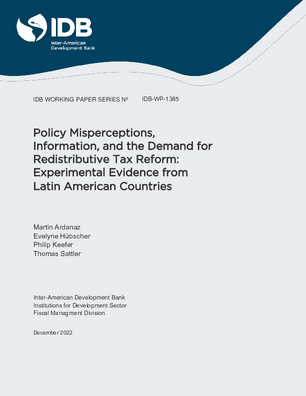Policy Misperceptions, Information, and the Demand for Redistributive Tax Reform: Experimental Evidence from Latin American Countries
Date issued
Dec 2022
Subject
Taxation;
Value-Added Tax;
Tax Increase;
Fiscal Policy;
Tax Reform;
Income Distribution;
Equality;
Tax Rate;
Tax Policy;
Rating
JEL code
D72 - Political Processes: Rent-Seeking, Lobbying, Elections, Legislatures, and Voting Behavior;
D90 - Intertemporal Choice: General;
H20 - Taxation, Subsidies, and Revenue: General;
H30 - Fiscal Policies and Behavior of Economic Agents: General
Category
Working Papers
Why do individuals preferences for redistribution often diverge widely from their material self-interest? Using an original online survey experiment spanning eight countries and 12,000 respondents across Latin America, one of the most unequal regions in the world, we find significant evidence for an under-explored explanation: misconceptions regarding the distributional effects of current tax policy. Treated respondents who are informed that an increase in the value added tax (VAT) is regressive are significantly more likely to prefer policy reforms that make the tax more progressive. Treatment effects are driven by the large fraction of respondents who underestimate the regressivity of the VAT, even though their misperceptions are linked to fundamental views about the world. These respondents are disproportionately right-leaning and more likely to attribute success to individual effort than luck. Despite the deep-rooted nature of respondents misperceptions, treatment effects are largest among individuals who hold these views of the world. These findings contribute both to understanding the political economy of redistribution and the potential for information interventions to shift support for fiscal adjustment policies protecting the most vulnerable.
Generative AI enabled




